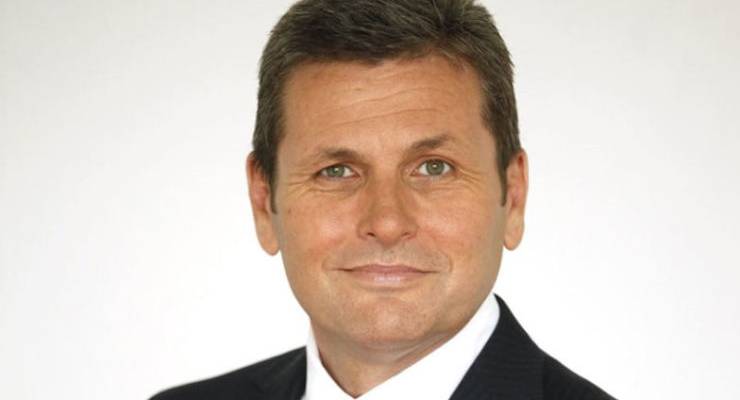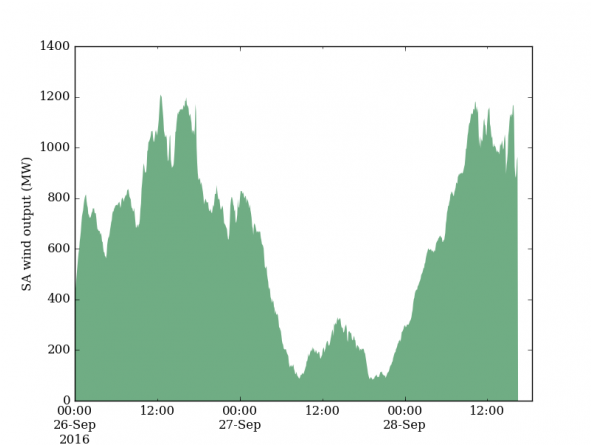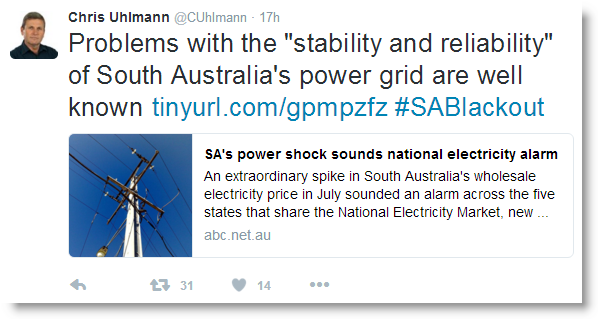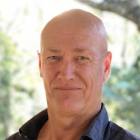
One of the most predictable reactions to the unprecedented blackout in South Australia on Wednesday was that wind energy and renewables would be blamed.
What was not expected is how the ABC would lead that charge.
Just an hour after the lights went out across the state of South Australia on Wednesday afternoon, ABC chief political correspondent Chris Uhlmann was on TV leaving viewers in no doubt about what he thought was the cause of the blackout: wind energy.
“Forty percent of South Australia’s power is wind generated, and that has the problem of being intermittent — and what we understand at the moment is that those turbines aren’t turning because the wind is blowing too fast.”
I almost drove my car off the road when I heard this a short time later on ABC News Radio, but there was worse to come. Uhlmann had chosen to interview the politician with the biggest unexplained beef against wind energy, South Australian Senator Nick Xenophon.
“So for the rest of our viewers, who would find it impossible to believe that an entire state can be blacked out, let’s walk our way through how this could possibly happen,” Uhlmann began. “Now 40% of South Australia is wind generated. The wind is blowing very hard at the moment, what’s the problem?”
Xenophon eagerly responded: “The generators don’t work when the wind is blowing too hard.”
Of course, both the assertions from Uhlmann and from Xenophon were absolute rubbish. As the state grid operator and the premier Jay Weatherill had already pointed out before this interview began, the blackout was caused by multiple failures of high-voltage transmission infrastructure.
Just how widespread those failures were was revealed later. More than 20 transmission towers were ripped from the ground by winds of cyclonic force, at least one generator was reportedly hit by lightning, and the whole grid blacked out — as it is designed to do in the event of such catastrophic failure.
It wouldn’t have mattered if the Northern brown coal generator was operating or not, or even if there were 20 such large scale generators online, the blackout would still have occurred, as the grid owner, the Australian Energy Market Operator, the Premier and even federal Energy Minister Josh Frydenberg made clear.
This was a failure of transmission infrastructure at an unprecedented scale in the face of a storm the likes of which had not been seen for half a century.

Wind turbines were actually providing more than 800MW of power when the lights went out (see graph above). So it wasn’t the lack of wind that was the problem. They didn’t operate after the blackout because they can’t. No plant can, not gas and not coal, until the grid is re-established.
Nether Uhlmann, nor the mainstream ABC news reports, made mention of the gas plants, which were also operating at the time of the blackout, and were also unavailable to generate after the event — because the grid was not working.
The problem with Uhlmann’s line — apart from revealing his own personal prejudice, or ignorance — was that it was still being repeated as gospel by mainstream ABC new reports, on ABC News Radio and local stations, into Thursday morning. Power was still out, the reports said, because wind power “was not available”.
Uhlmann was challenged over this comments on Twitter, and then he dug himself further into the mire, tweeting (above) that the reliability issues of the South Australian grid were well known.
His source from that claim? Certainly the Australian Energy Market Operator, which in several detailed reports has made it clear that there are no reliability issues in South Australia.
Uhlmann quoted his own story quoting the conservative Grattan Institute and the report from its lead energy analyst Tony Wood, who has become a controversial figure because of his relentless criticism of renewable energy, including a much contested and criticised report into solar energy earlier this year.
Wood’s report made much of the situation in South Australia to further its agenda to bring an end to state-based renewable energy initiatives and to push for more gas.
Uhlmann views were quickly echoed by like-minded commentators. Andrew Bolt spoke to the notorious anti-renewable economist Alan Moran, who predictably said it was all the fault of wind energy and that with “reliable electricity” the power would still be on. The usual suspects emerged elsewhere in the Murdoch media.
Even Fairfax had a go, with its energy reporter Brian Robins writing a piece saying that South Australia was “paying the price” of its investment in renewables.
His source? The same as Uhlmann’s, the Grattan Institute, and its claim that renewable energy had the potential to undermine supply security at a reasonable price, because it forced the closure of inefficient power stations without encouraging the construction of the necessary new generation supply sources.
The Grattan Institute’s Wood made his own appearance on ABC later in the evening, accepting that the blackout event was not triggered by wind farms, but then accusing the reliance on wind energy as the cause of the price surges in July.
Wood knows this is not true. Yes, wind power is variable and there are times when it doesn’t blow. But the events in South Australia, as the market operator and regulator and numerous studies have made clear, were exacerbated because the price of gas had surged to record highs, the interconnector was down for repairs, and the gas generators were free to exploit their market dominance.
A simple change of the bidding rules, being fought furiously by the gas generators, would change that because it would encourage competition such as battery storage.
Instead, Wood chose to use the occasion to again push for a halt to state-based renewable energy targets, a view that was enthusiastically supported by Frydenberg, deputy Prime Minister Barnaby Joyce, Xenophon, One Nation’s Malcolm Roberts and the fossil fuel lobby.
That much was a given. But you’d just expect better from the ABC.
*This article was originally published at Renew Economy









Frydenberg has just told us that wind power is way too expensive – whereas the damage to infrastructure from the effects of climate change ….
Following the Minister’s logic, the solution, of course, is to combust every deposit of carbon we possibly can.
Unbelievable comment from Uhlmann; he needs to explain himself.
Thank you Giles. Iwas waiting for the truth
It gives me no pleasure to learn that an ABC journalist that I had a great deal of respect for has allowed either his ignorance or bias to prevail.
I hope he has the courage to make his position clear. There is enough ignorance about electricity generation and distribution without making things worse.
Thanks for the correction Giles.
I’m not surprised at the beat up. Why should the facts get in the way of a good story, particularly if it fits an agenda?
The price of electricity in South Australia did indeed spike negative when it had too much wind power being intermittently generated at the same time as the grid operator did not have enough of the fast-responding open-cycle gas turbines running to balance it. If we are to indulge the popular sentiment to have windmills waving on the hilltops, we must commit to the extensive use of inefficient open-cycle gas turbines at the same time. Inevitably any use of wind turbines necessarily increases our reliance on gas. That stuff is methane when it leaks and carbon dioxide when it burns. Meanwhile the wind provides nothing more than prayers for guilty consciences.
The ABC for many years has been a loyal friend to this fashionable industry, with one eye open promoting renewables and the other eye closed, downsaying nuclear. It seems remarkably ungracious for Giles Parkinson to be biting the hand that feeds his industry. As the ABC increasingly reports on climatic disasters due to our continued usage of carbon including gas, we must expect to hear more scepticism about wind-backed-by-gas from other reporters than Chris Uhlmann.
This is hardly intelligible. The ABC put on a real expert on Thursday morning, who demolished “It’s the renewables fault”, propagated to the surprise of some but not me by Ullmann. The problem in July was due to a lack of wind, repair problems with the Victorian connector, and price gouging by the gas providers. The expert also said that the problem was that the network had not been been adjusted quickly to the needs of a decentralised network with backups needed for the inevitable transition to renewables. Scepticism about renewables is utterly baseless, although Turnbull has excelled himself by trying to score some political points. Why Crikey writers thoug hornbill would be good for the country is am mystery to me.
Dodger – excellent way to miss the point and point over there, “look something shiny!” or is it just the sickly glow from your beloved nukes?
As this article made clear and anyone who spent 2mins thinking about it, the problem was distribution, not generation.